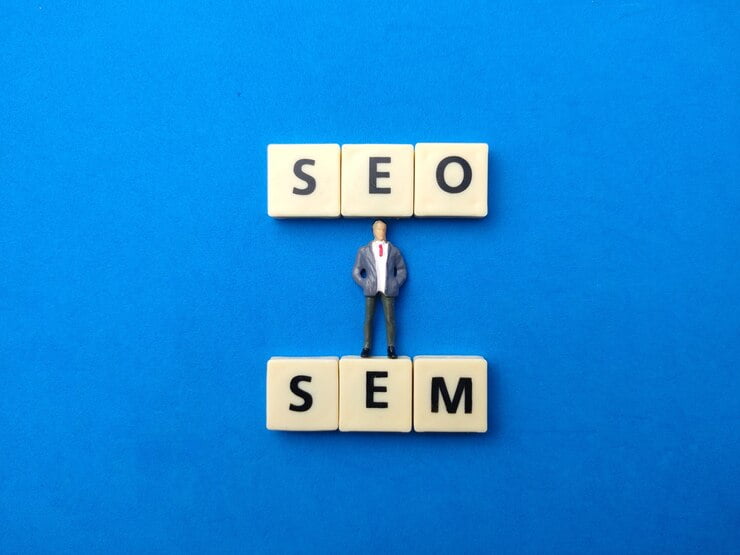Introduction
In today’s digital world, a strong online presence is essential for organizations of all sizes. However, with so many alternatives for increasing your exposure on search engines, it may be difficult to decide where to focus your efforts. Search Engine Optimization and Search Engine Marketing are two of the most used tactics. While both attempt to improve your exposure on search engines such as Google, they work in different ways and have distinct advantages. This article will explain the distinctions between both and help you decide which to focus for your business.
Understanding SEO
What is SEO?
Search Engine Optimization (SEO) is the practice of making your website appear higher in organic (non-paid) search engine rankings. The purpose is to enhance the volume and quality of visitors to your website via organic search engine results.
Key Components
On-Page: This entails optimizing specific pages on your website in order to rank higher. It entails keyword research and placement, meta tag optimization (title tags and meta descriptions), and ensuring that the material is of good quality, relevant, and useful to the reader.
Off-Page: Off-page focuses on actions conducted outside of your website that have an influence on your search engine rankings. This largely entails obtaining backlinks from respected websites, which indicate to search engines that your site is reliable and authoritative.
Technical: This refers to the backend components of your website that influence search engine crawling and indexing. It include optimizing site performance, assuring mobile compatibility, developing an XML sitemap, and enhancing site architecture.
Benefits
Long-Term Visibility: efforts accumulate over time, resulting in consistent organic visibility as your website builds authority and reputation.
Cost-Effectiveness: Unlike paid advertising, it generates free traffic, making it a cost-effective long-term approach.
Reputation and Trust: High organic rankings indicate to users that your website is credible and trustworthy, which may help boost your brand’s reputation.
Understanding SEM
What is SEM?
Search Engine Marketing (SEM) is a more comprehensive digital marketing approach that includes paid search advertising. Pay-Per-Click (PPC) advertising is the most frequent type of SEM, in which businesses bid on keywords to have their adverts show at the top of search engine results pages (SERPs) for relevant searches.
Key Components
Paid Search Ads: EM largely consists of designing and executing paid search advertising on sites like as Google advertising. These advertisements display above or beside organic search results and are marked as sponsored. `
Ad Copy and Keywords Targeting: A successful campaign requires captivating ad text and careful keyword selection. The idea is to get clicks from visitors who are more likely to convert.
Budget Management and Bidding Strategies: necessitates rigorous budget allocation and bidding procedures to provide the highest return on investment (ROI). You pay for each click on your ad, therefore it’s critical to optimise campaigns for optimal efficiency.
Benefits:
Rapid Results: offers rapid visibility since your advertising may show at the top of SERPs as soon as your campaign goes live.
High visibility on search engines: guarantees that your company is prominently shown to individuals searching for similar terms, improving the possibility of traffic generation.
Targeted Audience Reach: With, you can target certain demographics, areas, and even the time of day your advertisements appear, making it easier to reach your perfect audience.
Comparison of Both
Cost Considerations:
Search Engine Optimization: demands an initial commitment of time and money, such as content production, link building, and technological optimisation. However, once your site starts ranking, the recurring fees are little, and the traffic is basically free.
Search Engine Marketing: may be expensive, particularly in competitive industries with high cost per click (CPC). The constant costs of running advertisements and modifying bidding techniques can build up, making SEM a more expensive alternative in the long term.
Time to Results
Search Engine Optimization: is a long-term approach that may take months to yield substantial benefits. However, the consequences are long-term and can help your business.
Search Engine Marketing: SEM provides fast visibility, making it suitable for organizations that want speedy results. As soon as your ads are online, they may begin driving visitors to your website.
When to Prioritize Search Engine Optimization
Restricted Budget: If your company has a restricted marketing budget, investing may be more cost-effective in the long term. Although it takes effort, the traffic you get from organic search is almost free.
Focus on Long-Term Growth: If you want to have a strong online presence over time. It assists you in establishing a strong foundation that will continue to drive traffic and leads long after your first efforts.
Niche Markets: highly beneficial for firms in niche markets with limited competition. Ranking high for specialized, less competitive keywords might increase focused traffic to your website.
When to Prioritize Search Engine Marketing
Need for Quick Visibility: If you’re launching a new product or service and need to create traffic fast. Paid search advertisements will rapidly expose your brand to potential clients.
Time-Sensitive Campaigns: guarantees that businesses operating limited-time promotions, specials, or events reach their target audience when it counts the most.
Competitive businesses: In highly competitive businesses, SEO may be a lengthy and difficult process. SEM enables you to compete for visibility even if you are not currently ranking organically.
Combining Search Engine Optimization and Search Engine Marketing
While Search Engine Optimization and Search Engine Marketing both have their own advantages, combining the two can produce the best results. Businesses may develop a balanced and successful digital marketing strategy by combining SEM to drive immediate traffic with SEO to increase long-term presence.
Strategies for Integration
Use Search Engine Optimization for Keyword Insights: Data from your SEM campaigns may give useful information about which keywords generate the most traffic and conversions. You may then focus your SEO approach on these high-performing keywords.
Leverage Search Engine Optimization for Lowering Search Engine Marketing costs: A solid strategy may lessen your dependency on sponsored advertisements, cutting your overall SEM expenditures. By ranking organically for relevant phrases, you may save your ad budget while still increasing awareness.
Conclusion
Your business’s goals, money, and timetable all influence whether you prioritize both. Search Engine Optimization provides sustainable, long-term development and credibility, making it excellent for firms looking to build a strong online presence over time. On the other side, Search Engine Marketing delivers fast exposure and is ideal for organizations who want quick results or operate in competitive industries.
For many firms, a balanced approach that combines both can yield the greatest results. Understanding the benefits and drawbacks of each approach allows you to make educated decisions that are consistent with your business objectives.
Know more about us and Contact us for our services and more.
Check out our another blogs:
1.E-commerce SEO: 5 Proven Tips for Maximizing Your Online Store’s Success
2.AI Revolution: Ultimate SEO trends for 2024
3.The Power of Influencer Marketing: How to Boost Your Brand’s Visibility with AdLift Media
References:
1.SEO vs. SEM: What’s The Difference?
2.Difference Between SEO and SEM
Image Credits: Freepik






